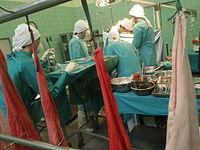
Photo from wikipedia
Background Living donor liver transplantation (LDLT) has been developed as one of gold standard treatments for end-stage liver disease. Mental health is a required selection criterion for adult living liver… Click to show full abstract
Background Living donor liver transplantation (LDLT) has been developed as one of gold standard treatments for end-stage liver disease. Mental health is a required selection criterion for adult living liver donors and may influence the quality of life after operation. Patients and methods A total of 1,210 potential living donor candidates for liver transplantation (LT) underwent psychosocial evaluation that included a semi-structured interview, multi-choice self-reported inventory (Beck Depression Inventory-2nd edition [BDI-II], Beck Anxiety Inventory [BAI]), and the family APGAR (Adaptability, Partnership, Growth, Affection, Resolve) index. The test results were compared by family relationships, and subgroups were classified based on the donation type: 1) parents to children, 2) grown children to parents, 3) siblings to siblings, 4) spouses to spouses, and 5) other relatives to other relatives. Results The BDI-II (P < 0.001) and BAI differed considerably according to the donation type in potential donor candidates. Compared with other subgroups, parents donating to their children suffered the most severe psychological stress before LDLT and exhibited more depressive (P < 0.001) and anxiety symptoms. However, the stress associated with grown children donating to their parents, siblings, and spouses was not significantly higher than it was for other relatives. Furthermore, a significant negative correlation existed between family APGAR scores and the severity of depression and anxiety (P < 0.001) among potential donor candidates. Conclusion These results indicate the importance of understanding potential donor candidates’ psychological characteristics before LT. Greater anxiety and depression may be exhibited by parent donors due to the distress from fears of death or illness of the recipients, or their guilty feeling for their child. Additionally, family dysfunction also revealed more depression and anxiety. Such donor candidates should be given more extensive pre-donation counseling for minimizing pre-LDLT psychological stress.
Journal Title: Neuropsychiatric Disease and Treatment
Year Published: 2018
Link to full text (if available)
Share on Social Media: Sign Up to like & get
recommendations!